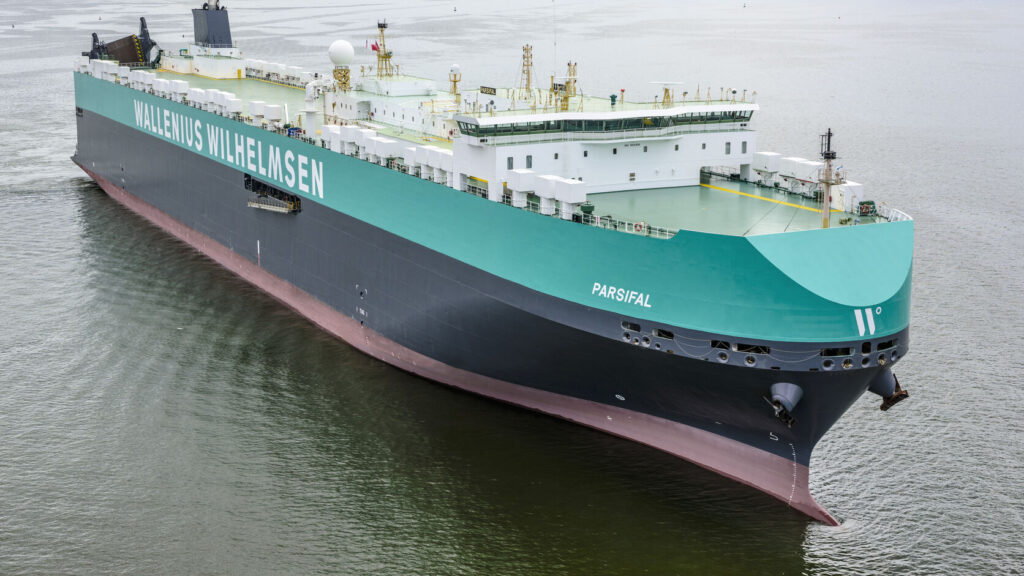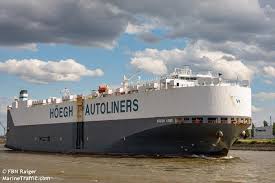

〆One is an announcement from Wallenius Wilhelmsen ASA about the impact of an accident in Baltimore on their performance.
〆 The other involves Höegh Autoliners selling a second-hand vessel at a high price, amid a global shortage of car carriers.
With a worldwide scarcity of car carrier capacity emerging, Wallenius Wilhelmsen and Höegh Autoliners have made intriguing releases.
Wallenius estimated the loss from not being able to use the Port of Baltimore due to a cargo ship operated by Maersk (owned by Grace Ocean and managed by Synergy Marine) destroying a bridge in Baltimore, at between 5 and 10 million US dollars.
It’s worth pondering what impact this might have on future claims for damages related to the accident. On another note, Höegh Autoliners announced the sale of the 18-year-old car carrier, “HOEGH KOBE,” capable of carrying 6,000 vehicles, for 59 million dollars (approximately 8.9 billion yen) in a global market facing a shortage of car carrier capacity.
The sale price of this vessel is considered exceptionally high. Major Japanese shipping companies are losing opportunities to transport customers’ cars due to the detour around the Suez Canal. For shipping companies without spare car carrier capacity, the current blockade of the Suez Canal is having a negative impact.
Wallenius has expressed concerns about a potential loss of up to $10 million due to the Baltimore accident.
European car and RORO ship company Wallenius Wilhelmsen ASA announced on April 3, 2024, that the collapse of a major bridge at the Port of Baltimore on the east coast of the United States could negatively impact its EBITDA (Earnings Before Interest, Taxes, Depreciation, and Amortization) by between $5 million and $10 million (approximately 760 million to 1.5 billion yen) for the current quarter.
The company’s estimate assumes that the current disruption will last for one month. Wallenius has factored in the decrease in logistics operations at the Port of Baltimore and the reduced number of vehicles transported due to the inactivity of the car carrier “CARMEN” remaining in the port.
Wallenius operates a processing center at the Port of Baltimore. This center offers services such as pre-delivery inspection, repair, storage, and distribution. It handles a wide range of import and export goods, including automobiles and heavy machinery.
According to Wallenius, although ships cannot dock at the port’s terminal due to the incident, there is no disruption to land transportation, and the processing center is operational. The cargo that was supposed to be transported by sea to this port is now being redirected to other ports, such as Newport News, Newark, and Savannah.
〆Höegh Autoliners has sold an 18-year-old car carrier. The sale price for the used vessel was 59 million US dollars.
Norwegian car and RORO ship company Höegh Autoliners announced on March 2, 2024, that it sold the 18-year-old car carrier capable of carrying 6,000 vehicles, “HOEGH KOBE,” for 59 million dollars (approximately 8.9 billion yen). Höegh plans to deliver the vessel to the buyer in July 2024.
The “HOEGH KOBE” is registered under the Singapore flag and was built in South Korea in 2006. A ship-owning subsidiary established by Höegh Autoliners in Singapore owned the vessel, and the repayment of the borrowed funds for its construction has been completed.
Höegh Autoliners is advancing the construction of environmentally friendly next-generation car carriers, known as the “Aurora Class.” Regarding the sale of the used ship, the company has stated, “As the inaugural voyage of the first newbuild ship approaches, selling the vessel allows us to optimize our fleet.”